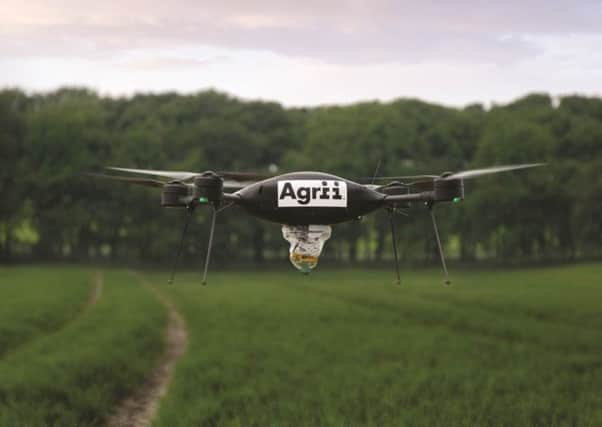A high-flying start to agricultural education


Robotic milking parlours and GPS guided combine harvesters are among the innovations that are driving efficiencies at ground level, albeit with significant investment costs up front.
And this ‘upscaling’ of technology in farming may well be playing into the hands of an industry which is not traditionally seen as high-tech from the outside.
Advertisement
Hide AdAdvertisement
Hide AdIt is a frequently repeated statistic that the average age of a UK farmer is 59 and with that number comes legitimate concerns about just how much young blood is coming into the industry at a time when substantial population growth puts more pressure on the nation’s ability to feed itself.
But it could be argued that the next generation of farmers are more tech-savvy than ever before and the increasingly high-tech nature of farming can only encourage younger generations – so familiar with iPads, the internet and social media – into careers that those before them may have dismissed as unattractive options.
For the next cohort of students starting agricultural studies at East Yorkshire’s Bishop Burton College at the end of the summer, the technological revolution that is currently sweeping through the farming world will be brought very much into focus.
Come September, the Beverley-based college will be incorporating a drone into youngsters’ agricultural education, which has come about through its partnership with agronomy services provider, Agrii.
Advertisement
Hide AdAdvertisement
Hide AdIt comes after the Cheltenham-based firm chose the college as the location for its state-of-the-art Crop Technology Centre. The unmanned aerial vehicle (UAV), which costs around £30,000, will be used across the different levels of agriculture courses to help students gather information and data.
Helen Martin, agricultural course manager at the college, explained: “Imagine a flying spider carrying a camera underneath. The images the camera picks up can be fed on to a screen so students can see what is happening in all corners of a field.
“This overhead view gives a much more comprehensive picture than traditional crop-walking alone.”
Industry leaders are convinced that this new generation of drone technology will play a key role in the management of food production in the near future.
Advertisement
Hide AdAdvertisement
Hide AdDrones can be used to assist agronomists and farmers to identify where pests and diseases are affecting crops, pinpoint where weeds are accumulating and spreading to, and help to estimate total crop yields.
Bishop Burton College is also hoping to make use of the drone in other specialist areas of agriculture.
Aside from acquiring the drone, the college has been building up its commercial beef enterprise which includes a herd of pedigree Hereford cattle, as well as overseeing developments to its dairy and growth in its mechanical-based courses.
Ms Martin said: “We will also be looking at how the drone can be developed for livestock farming.
Advertisement
Hide AdAdvertisement
Hide Ad“It’s ideal for checking sheep on the side of a mountain, or keeping an extra eye on large herds of animals. The drone is very much the next big thing in farming and we feel very lucky to be able to have the use of one.”
The college is also involved in a wider project involving drones. It is acting as a strategic research partner for Leeds-based supermarket chain Asda on projects and field trials which are aimed at improving sustainability within the meat industry.
In what the college has described as the first initiative of its kind, students are collaborating with a host of industry partners – Dunbia, Cranswick Country Foods and ABP Food Group – with the first projects involving agricultural drone technologies, cattle nutrition trials and CCTV-based research to understand piglet mortality.
When the research was announced last autumn, Jeanette Dawson, the college’s principal and chief executive, said the partnership would enhance students’ career prospects.
Advertisement
Hide AdAdvertisement
Hide AdShe said: “I’m particularly proud that our first-rate facilities have been chosen to host this unique initiative, which will not only see the college’s students contributing to significant research and development projects, but will also pave the way for them to secure promising careers in the agri-food industry.”